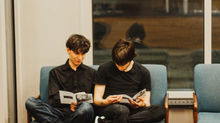Goin' Rogue
- Jun 15, 2016
- 4 min read

I am what you would consider a veteran of the Chalkboard Theatre Project, participating in every Eastern University experiment from the very first year we started. It’s hard to put into words the magic that happens over the course of a CTP experiment, though I can easily say have been some of the most rewarding collaborative experiences of my artistic life.
Of course, when you take part in an annual event, you grow accustomed to the pattern of things: how we always gather as a large group to mingle and meet one another, celebrating reunions of collaborators who may not have seen each other since the year before, meeting the new crop of artists who have signed on for something they may not be able to fully anticipate; how we split into our teams and spend time getting to know one another and determining what our group dynamic will be; how the night tends to have a narrative arc all its own, fueled by caffeine, snacks, and sheer determination to breathe a new piece of art into being; how we don’t get to see what each group is working on (and some groups go to great lengths to keep their piece private) until we all come back together to run through the full gamut of new plays. You begin to count on the almost clockwork arrival of the inevitable curveball.
So, if there is such a recognizable familiarity to the experience, how is each one different enough to bring someone back year after year? For me, the reasons to return are numerous: the challenge of creating a brand new work; the opportunity to push the boundaries of what I believe I can accomplish in 24 hours; the joyous reunions that take place between past collaborators, some of whom I only get the chance to see when we come back to our alma mater to participate in this project. On top of all of this, I have given myself the additional challenge every year of breaking the rules and going rogue – which is, in fact, encouraged.

What does rogue look like? It changes every year. The first experiment with going rogue was a partnership between one of my greatest friends and favorite collaborators, Brian Farrell. We were lucky enough to have worked together on a piece in our very first CTP experiment and we rebelliously wanted to find a way to work together again in spite of being on different teams the next year. So we tossed around the idea of sneaking off at some point in the 24 hours to stage a completely different piece, which ended up being a sound and movement experiment that we stormed the stage with after the final bows. Thus was Team Rogue born.
Each year since, Team Rogue has evolved, bringing in new members (the only requirement for admission that you have taken part in one previous experiment) and finding different means of disrupting the proceedings. Ben, Kendra, and Eva, being the clever leaders that they are, decided one year to harness the spirit of Team Rogue by creating a group of 3 collaborators (Andrew Whitehead, Brooke Fitzgerald, and myself) who had free reign over the roles we chose to perform (no assigned writer, director, actor for us – although we were divided into specific roles at the beginning of the night so people wouldn’t suspect us).
We called ourselves Team Awesome, and we didn’t want to settle for just writing a good play that would be fun to perform. We wanted to push our boundaries by incorporating music, movement, and brutally honest, introspective writing. And our piece exceeded my expectations. I was truly given a gift that year, and was unsure of how another experience could top that one.

By the next year, I was itching to one-up the experience of Team Awesome. For several years, I had been stewing on the idea of joining my group with another. How much more could one do with more actors, more perspectives in the room! The opportunity to finally put this idea in to action presented itself somewhat organically – one group had an actor who couldn’t make it at the last minute, and they were open to thinking outside the box. Of course, it didn’t hurt that I had been asked to direct that year, the only role that I wasn’t enthusiastic to take on (only because I don’t consider myself a strong director so I was looking for a creative way to make the job more palatable) and the writer of the other group, Rebekah Henson, is one of my closest friends and we had discussed the possibility of going Rogue together. So here we had a pure opportunity to combine groups, work together, and break the rules yet again, and we talked with all the members of our respective teams, ultimately deciding to form Team Super Group.
Of course, we knew our plan would be discovered, but we kept things under wraps until it was impossible. The big concern from BKE was that, in a group with two writers, two directors, and three actors, that work would still be evenly distributed, and that all voices would be honored. It was also agreed that we would keep the formation of Team Super Group a secret from the other teams, so when it was time for role specific meetings, both teams sent representatives. Our rogueness was not only
completely legitimized by this point, it was being sheltered and honored by our producers, and it helped us create a truly wonderful and hysterical piece.

I’m not sure what future iterations of Team Rogue will exist – once you get the stamp of approval and eager expectation from the folks running the show, you’ve got to find a new way to skirt the rules. But it’s a challenge I’m delighted to continue to set for myself.




























Comments